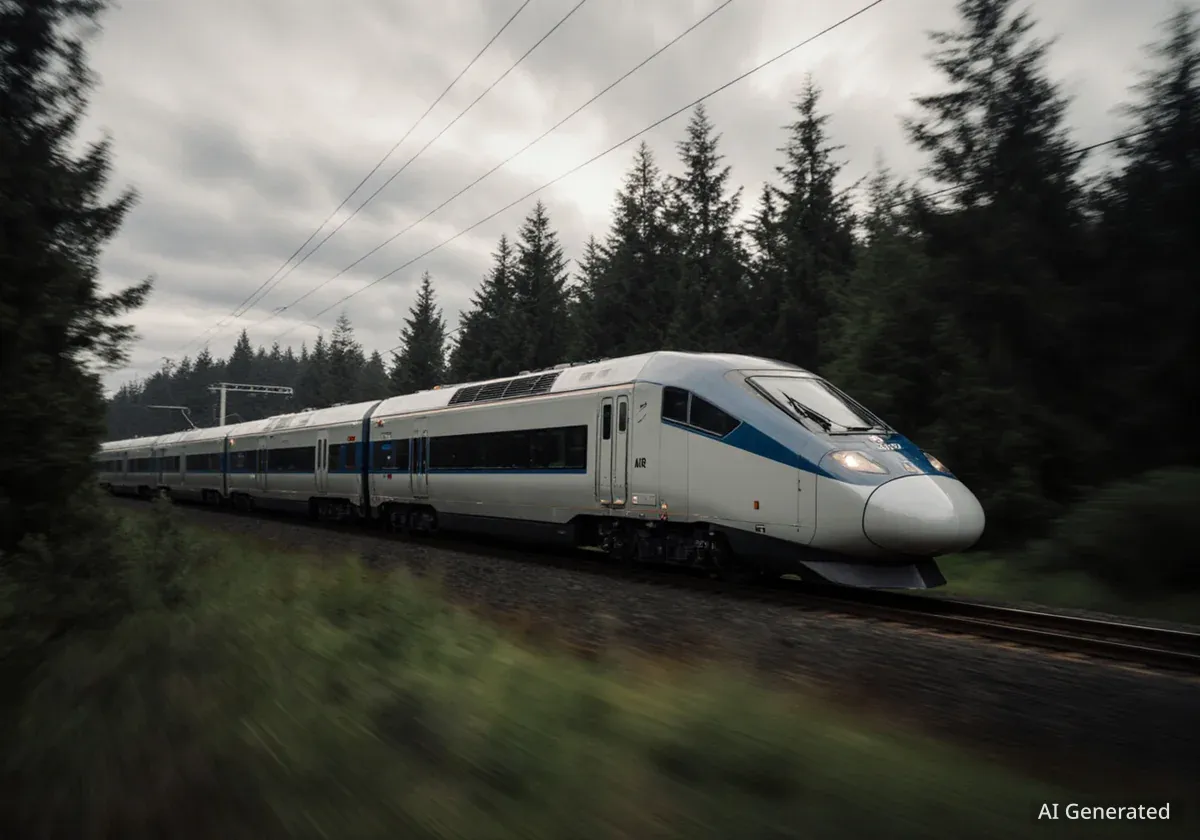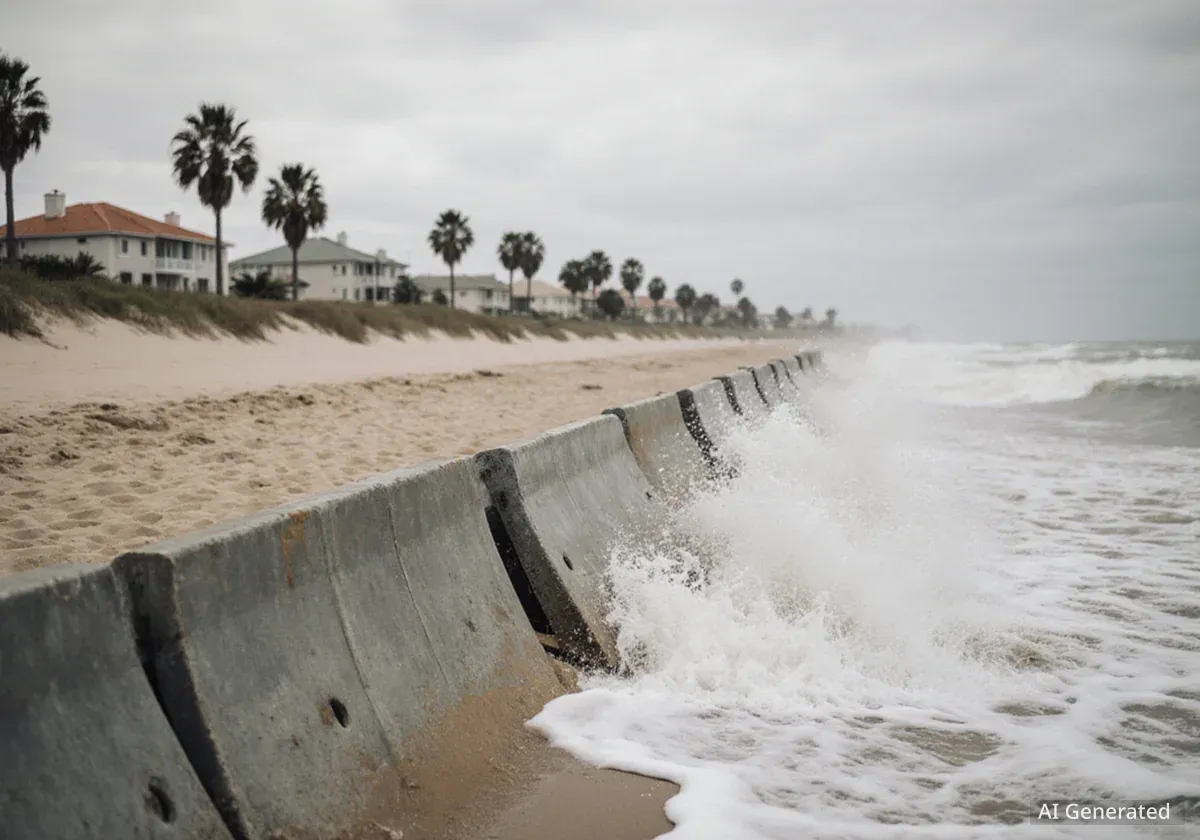Germany is experiencing a series of significant developments, ranging from leadership changes at its national railway operator, Deutsche Bahn, to a notable increase in digital exports within the eurozone. Meanwhile, President Frank-Walter Steinmeier held discussions with Pope Leo XIV at the Vatican, addressing global conflicts and interfaith dialogue. These events highlight key shifts in German infrastructure, economy, and international relations.
Key Takeaways
- Evelyn Palla appointed as Deutsche Bahn's first female CEO.
- Deutsche Bahn sets new punctuality targets: 70% by 2029, aiming for over 90% long-term.
- German digital exports to the eurozone increased by 10% in July.
- President Steinmeier urged Pope Leo XIV to mediate in global conflicts.
- Berlin Brandenburg Airport experienced delays due to a weekend cyberattack.
Deutsche Bahn Appoints New CEO and Unveils Strategy
Germany's national rail operator, Deutsche Bahn (DB), has announced a new chief executive and a revised strategy aimed at improving service reliability. Evelyn Palla, 52, has been named the new CEO, making her the first woman to lead the state-owned railway company. Her appointment follows the dismissal of former CEO Richard Lutz last month, amid growing concerns over punctuality and infrastructure issues.
Palla previously led DB Regio, the subsidiary overseeing regional rail operations in Germany and neighboring countries. Her experience in managing day-to-day services has been welcomed by both the train drivers' union (GDL) and the passenger advocacy group "Pro Bahn."
"Our list of potential internal candidates was short but Frau Palla was on it," said Detlef Neuß, chairman of Pro Bahn. He praised Palla's work at DB Regio, calling her "an absolutely suitable CEO."
GDL boss Mario Reiss also commented, calling Palla "an experienced manager." He added that her appointment sends an "encouraging signal" given her close attention to punctuality and passenger statistics.
New Punctuality Targets and Investments
Transport Minister Patrick Schnieder (CDU) outlined new punctuality goals for Deutsche Bahn's long-distance trains. The short-term target is at least 70% punctuality by 2029. This will then increase to 80% in the medium term, with an eventual goal of over 90%.
Currently, only about 60% of long-distance ICE, IC, and EC trains arrive on time. A train is considered "on time" if it has a delay of less than six minutes. This contrasts with other European countries like Switzerland (99%), Belgium (96%), and France (87%), though France is more comparable to Germany in size.
Punctuality Comparison (2024 Long-Distance Trains)
- Germany: approximately 60%
- Austria: 81%
- Czech Republic: 83%
- France: 87%
- Denmark: 91%
- Belgium: 96%
- Switzerland: 99%
Minister Schnieder acknowledged that improvements would take time. He confirmed that significant funding from the German government's €500 billion special fund for infrastructure will be allocated to the railway. Specifically, €10 billion is earmarked for digitalization by 2029. Investments in station security and cleanliness are set to begin in early 2026, with customer service and communications improvements expected by 2027.
President Steinmeier Meets Pope Leo XIV in Vatican
German Federal President Frank-Walter Steinmeier visited the Vatican for a private audience with Pope Leo XIV. During their meeting, President Steinmeier encouraged the pontiff to play a mediating role in ongoing global conflicts, including those in Ukraine and the Middle East. He also extended an invitation for Pope Leo to visit Germany.
Steinmeier, who is Protestant, emphasized the importance of the Church's role in society. "The churches can and must play a positive role in [maintaining] the cohesion of our society," he stated after the meeting. He added that the "voice from Rome is as important as ever" for Germany.
"If the pope and the Vatican offer their help, we cannot afford to turn it down," President Steinmeier remarked.
While an invitation has been extended, there are no concrete plans for a papal visit to Germany yet. Vatican sources suggest that the US-born Pope's first foreign trip could be to Turkey later this year. Pope Francis, Leo's predecessor, did not visit Germany during his pontificate. The Catholic Church in Germany has seen a decline in membership, with approximately 320,000 members lost year-on-year, bringing the total to 19.8 million as of 2024.
Role of the German Federal President
As federal president, Frank-Walter Steinmeier serves as Germany's largely ceremonial head of state. This role is distinct from that of Chancellor Friedrich Merz, who leads the current German government.
Police Investigate Possible Sabotage on Rail Network
Police in Cologne are investigating a potential "political motive" after train cables were cut between Cologne and Düsseldorf. This incident led to significant disruptions in rail services across the densely populated region. Authorities discovered the severed cables in a shaft in the Rheindorf area of Leverkusen around 1:15 a.m.
Unknown individuals reportedly opened an underground cable shaft and cut all the cables around midnight. Police indicated that the damage was more extensive than initially believed, requiring an entire day for repairs. Service on the affected line was eventually restored by 6:20 p.m.
This event marks the latest in a series of suspected sabotage acts targeting Germany's rail infrastructure. Police stated that "a political motive cannot be excluded at this time." Germany is currently on high alert for potential sabotage attacks. Last month, a far-left group named the "Angry Birds Kommando" claimed responsibility for at least one arson attack on the rail system.
Germany's Digital Exports Boosted by Eurozone Demand
German electrical and digital exports to its eurozone partners saw an increase for the third consecutive month in July. This growth helped to offset reductions in exports to China and the United States. Data from the German Electro and Digital Industry Association (ZVEI) shows that shipments within the eurozone surged by 10%, reaching €6.8 billion ($8 billion).
This increase counteracted a 6% drop in exports to China and a 2.2% decline to the United States. Overall, Germany's digital exports experienced a year-on-year increase of 6.1%, totaling €21 billion for the month.
"Tariffs are hanging over US business, and China's economic growth has now fallen to just 5%," explained Andreas Gontermann, Chief Economist at the ZVEI.
Public Transportation Use Continues to Rise
Despite ongoing issues with punctuality and reliability, the number of Germans using public transportation continued to increase in 2025. Germany's Federal Statistical Office reported that Germans made approximately 5.7 billion journeys on public transportation in the first half of this year. This represents a 1% increase compared to the same period in 2024.
Long-distance train travel specifically saw a 4% increase, totaling 71 million trips. However, strikes during the previous year make direct comparisons less reliable for this category.
The initial surge in public transportation use following the introduction of the nationwide Deutschlandticket appears to be slowing down. Launched in May 2023, the Deutschlandticket allows travel on all buses, trams, and regional trains (excluding long-distance ICE, IC, or EC trains) across the country. Initially priced at €49 per month, it now costs €58 per month.
Deutschlandticket Impact
- Around 14 million people currently hold a Deutschlandticket.
- The price is set to increase again to €63 per month in 2026.
- Travel and consumer groups express concern that rising prices could lead passengers to return to private cars.
Berlin Airport Faces Delays After Cyberattack
Berlin Brandenburg Airport experienced continued flight delays and long queues on Monday morning following a weekend cyberattack. The attack, which occurred on Friday night, targeted IT service provider Collins Aerospace. This incident also affected check-in systems at other major airports, including London Heathrow, Brussels, and Dublin.
While other German airports were not affected, Berlin Airport warned that problems would likely persist into the week. This was especially true given the increased passenger numbers due to Sunday's Berlin Marathon. Travelers were advised to use online check-in and self-service luggage drop-off kiosks where possible.
An airport spokesman confirmed only one flight cancellation on Monday but could not specify how long IT system repairs would take. "We have to be 100% sure that no malware remains in our systems before we boot them all up again," he stated. Brussels Airport asked airlines to cancel about half of Monday's planned flights, though ultimately only 60 out of 550 departures and arrivals were canceled. Dublin Airport reported minimal impact, with some processes handled manually.





